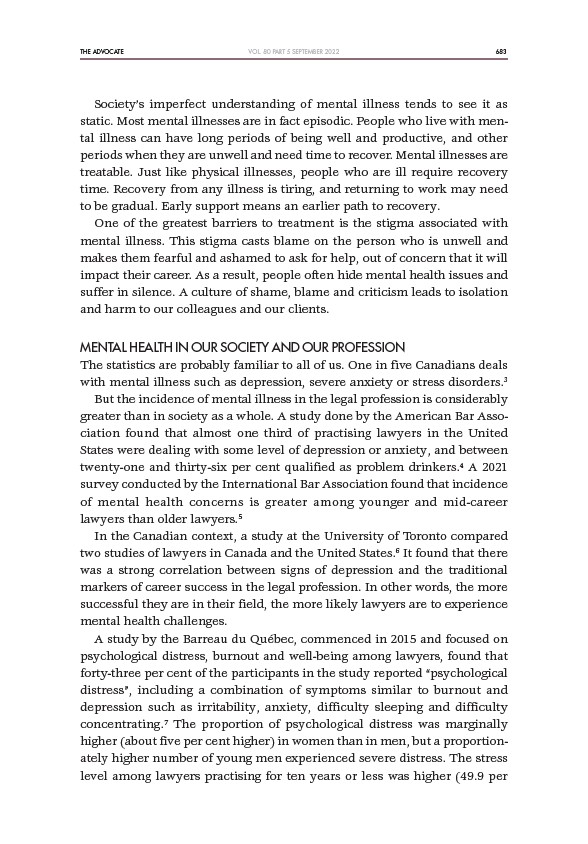
THE ADVOCATE 683
VOL. 80 PART 5 SEPTEMBER 2022
Society’s imperfect understanding of mental illness tends to see it as
static. Most mental illnesses are in fact episodic. People who live with mental
illness can have long periods of being well and productive, and other
periods when they are unwell and need time to recover. Mental illnesses are
treatable. Just like physical illnesses, people who are ill require recovery
time. Recovery from any illness is tiring, and returning to work may need
to be gradual. Early support means an earlier path to recovery.
One of the greatest barriers to treatment is the stigma associated with
mental illness. This stigma casts blame on the person who is unwell and
makes them fearful and ashamed to ask for help, out of concern that it will
impact their career. As a result, people often hide mental health issues and
suffer in silence. A culture of shame, blame and criticism leads to isolation
and harm to our colleagues and our clients.
MENTAL HEALTH IN OUR SOCIETY AND OUR PROFESSION
The statistics are probably familiar to all of us. One in five Canadians deals
with mental illness such as depression, severe anxiety or stress disorders.3
But the incidence of mental illness in the legal profession is considerably
greater than in society as a whole. A study done by the American Bar Association
found that almost one third of practising lawyers in the United
States were dealing with some level of depression or anxiety, and between
twenty-one and thirty-six per cent qualified as problem drinkers.4 A 2021
survey conducted by the International Bar Association found that incidence
of mental health concerns is greater among younger and mid-career
lawyers than older lawyers.5
In the Canadian context, a study at the University of Toronto compared
two studies of lawyers in Canada and the United States.6 It found that there
was a strong correlation between signs of depression and the traditional
markers of career success in the legal profession. In other words, the more
successful they are in their field, the more likely lawyers are to experience
mental health challenges.
A study by the Barreau du Québec, commenced in 2015 and focused on
psychological distress, burnout and well-being among lawyers, found that
forty-three per cent of the participants in the study reported “psychological
distress”, including a combination of symptoms similar to burnout and
depression such as irritability, anxiety, difficulty sleeping and difficulty
concentrating.7 The proportion of psychological distress was marginally
higher (about five per cent higher) in women than in men, but a proportionately
higher number of young men experienced severe distress. The stress
level among lawyers practising for ten years or less was higher (49.9 per